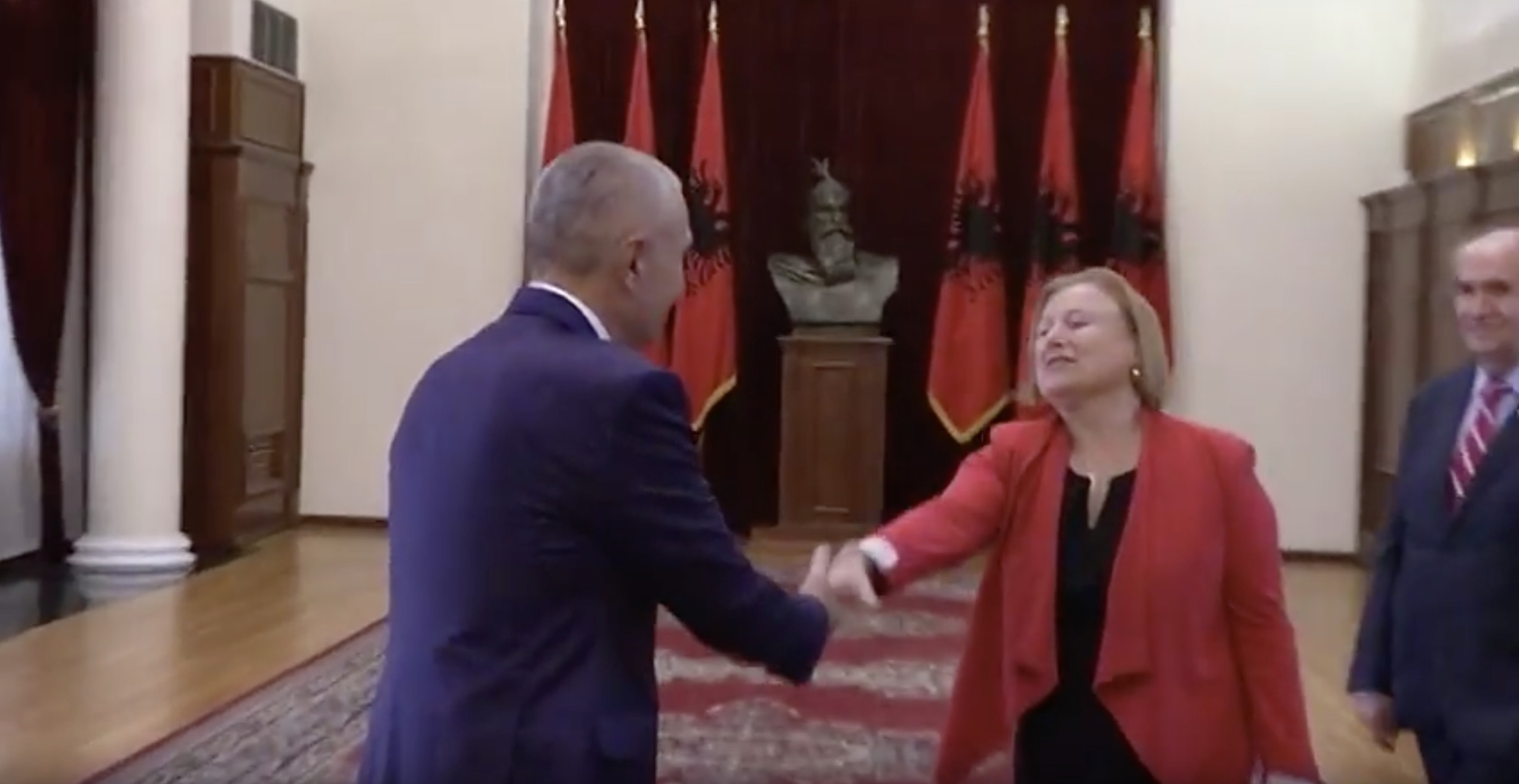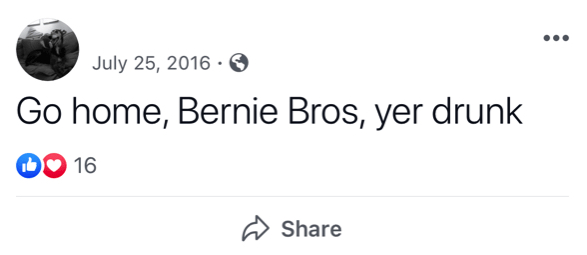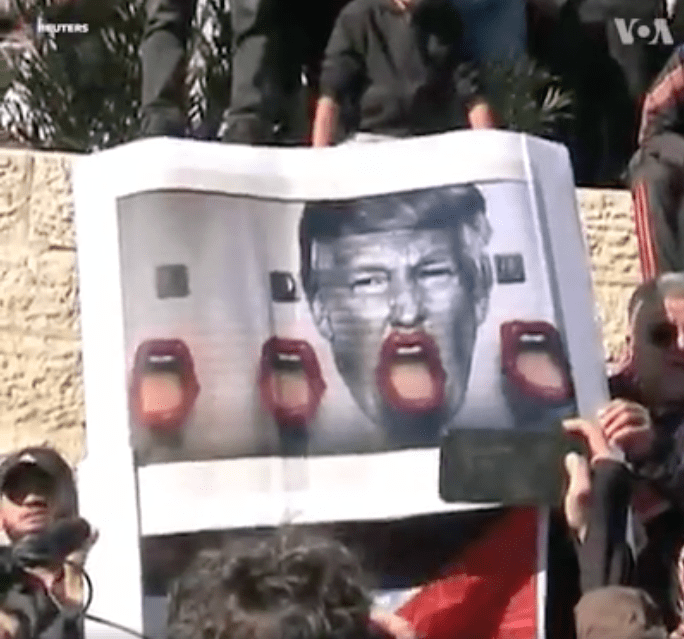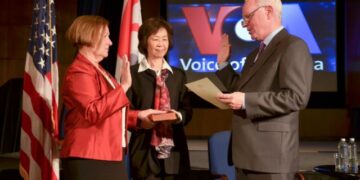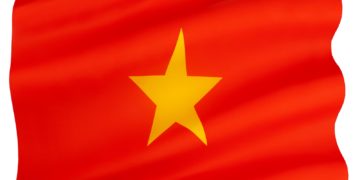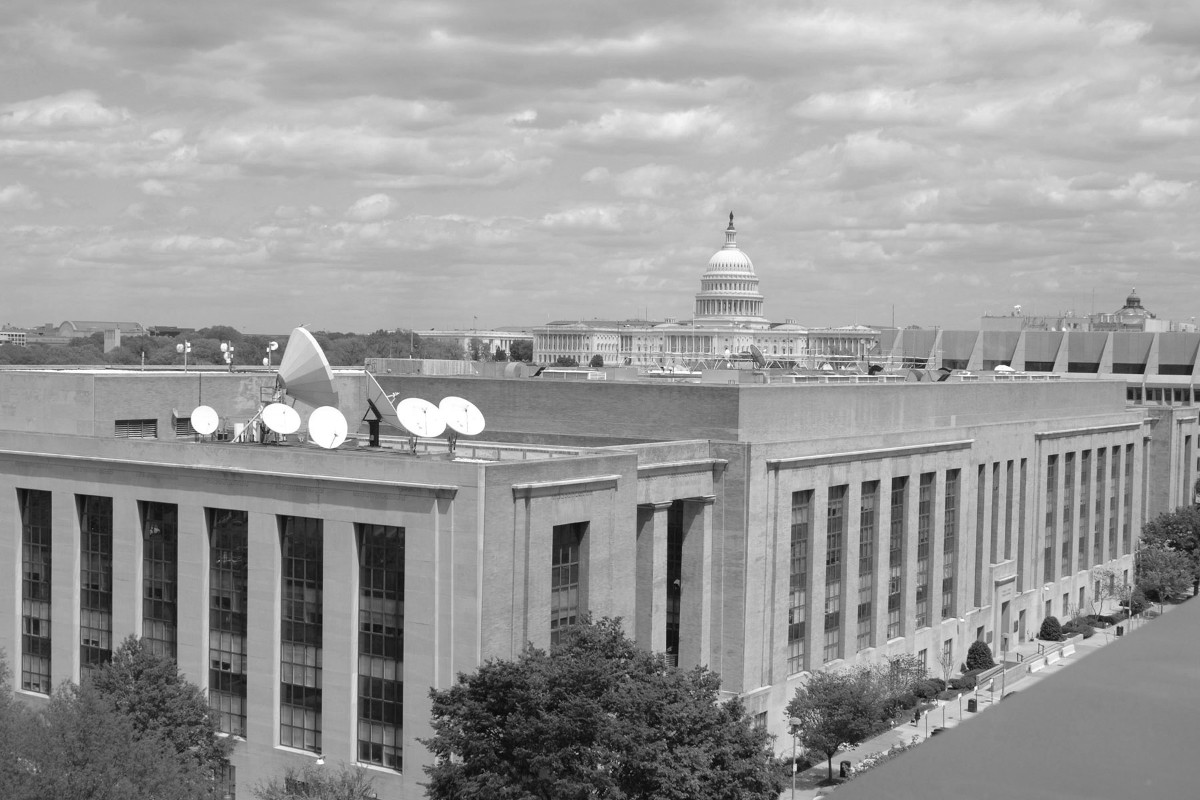USAGM WATCH COMMENTARY
Recent media reports from Nigeria and social media posts by Nigerian government officials shed an interesting light on how journalists of the U.S. tax-funded and U.S. government-run but claiming to be journalistically independent Voice of America are being guided and managed by VOA director Amanda Bennett, a holdover appointee from the Obama administration. It seems from these reports that Ms. Bennett has failed to enforce clear rules for VOA U.S. government employees who meet with foreign politicians for reasons other than news reporting. Much better enforcement of these rules is needed both for Director Bennett and for VOA reporters to avoid appearances of bias, partisanship and other forms of conflict of interest.
We have seen a few examples from Nigeria and from the Balkans of how meetings between local politicians and representatives of the Voice of America are being conducted and how they are perceived by local government officials, local journalists, and VOA journalists themselves. The photo taken from a video broadcast by the Voice of America Albanian Service and posted on social media shows VOA Director Amanda Bennett meeting Albanian President Ilir Meta in Tirana in September 2017.
There does not seem to be much difference between how VOA leaders and some VOA journalists deal with foreign and U.S. politicians. It may be unreasonable to expect VOA reporters to behave any other way when they see that executives in charge of the Voice of America and its parent federal agency, the U.S. Agency for Global Media (USAGM), have publicized medals being given to VOA journalists in their presence by foreign government officials at the VOA headquarters in Washington and publicize their own meetings with foreign leaders who are controversial as almost all politicians are. Some former USAGM Board members and one VOA executive are believed to have had corporate or family business interests in foreign countries ruled by authoritarian governments, including China and Russia. These business activities are not believed to be illegal, but they raise serious concerns in a tax-funded, U.S. government operated journalistic organization.
We were therefore not surprised that the following report, titled “VOA headship: What Mustapha’s appointment means to us – Tambuwal,” appeared on March 4, 2020 on the Nigerian news platform Newsdiaryonline.com and that the Nigerian news site report was almost immediately re-posted on Facebook by Aliyu Mustapha Sokoto who was identified as the current chief of the VOA Hausa Service. The report describes in some detail lavish praise for the newly-promoted Voice of America journalist from Aminu Waziri Tambuwal who serves as the Governor of Sokoto State in Nigeria. Governor Tambuwal had won his office during the 2015 general elections and was re-elected in the 2019 general elections.
Voice of America journalist Aliyu Mustapha Sokoto is well-known in Nigeria after spending 30 years working in the VOA Hausa Service. In 2018, as VOA Hausa Service Managing Editor, he accompanied VOA Director Bennett with Africa Division Director Negussie Mengesha on a trip to Nigeria. Following the VOA Hausa Service bribery scandal in early 2018 and the firing of more than a dozen VOA Hausa journalists at the end of 2018, Aliyu Mustapha, who had no connection to the scandal, became the Hausa Service chief in Washington in November 2019. Before joining the VOA, Mr. Mustapha had worked with the Nigeria Television Authority (NTA) in his native Sokoto State.
While visiting Nigeria on official U.S. government business for the last several days, Aliyu Mustapha posted on Facebook a link to the article about him in Newsdiaryonline.com, which described his public relations activities and included quotes from him and from Governor Tambuwal.
As reported in the article, Governor Aminu Tambuwal described the chief of the VOA Hausa Service as “a resilient, dogged and patient professional journalist, who weathered the storm throughout his brilliant career, adding that his appointment was by no small measure, a deserving feat.”
According to an article published by another Nigerian online newspaper, Sundiata Post, on Wednesday Governor Aminu Tambuwal of Sokoto State gave a civic reception in honor of Aliyu Mustapha.
During the reception, Governor Aminu Tambuwal urged journalists to be objective in their reportage and uphold the ethics of the profession, the online newspaper reported. As also reported by Sundiata Post, the Governor said that “it is unprofessional for journalists to be involved in acts capable of instigating conflicts and disunity in the country.”
Sundiata Post also reported that the VOA journalist responded by saying that government needed the support of journalists to address challenges bedeviling the country, and, as reported by Sundiata Post, implored journalists to project the country positively while placing less emphasis on negative developments.
According to Sundiata Post, News Agency of Nigeria (NAN) reported that “the event was attended by a business mogul, Umarun Kwabo, Speaker, Sokoto State House of Assembly, Aminu Achida, government officials and community leaders, among others.”
The Nigerian Daily Trust reported on February 21 that the VOA’s head of Hausa Service, Aliyu Mustapha Sokoto, disclosed during a courtesy visit to another Nigerian state governor, Governor Muhammad Inuwa Yahaya, that the Voice of America plans to establish “a regional reporting centre in Gombe state to coordinate the station’s activities in the North East sub-region of the country.”
We were able to follow Nigerian coverage of the VOA journalist’s visit because Aliyu Mustapha, a Nigerian state government official and others in the Sokoto State have posted on Facebook numerous photographs and videos from the Governor’s reception for the VOA Hausa Service chief and from other events during his visit.
We are not experts on Nigerian politics, but according to a Nigerian media article, in the March 9, 2019 Sokoto State gubernatorial election and in March 22, 2019 Sokoto State supplementary election, Tambuwal was reelected as governor having polled 512,002 votes while his rival Mr. Aliyu of the All Progressive Congress Polled 511,660 votes. The margin of victory was only 342 votes, according to the electoral commission. The outcome could have been easily affected either way by media coverage and presumably can be influenced by media coverage in any such future very close elections.
How appropriate is it therefore for Voice of America officials and journalists to be linked so prominently through self-generated PR and other media publicity with some politicians in the United States and abroad? Are VOA officials and journalists allowing themselves to be used by foreign and U.S. politicians to advance their standing with the electorate or to promote certain policies?
Unfortunately, VOA Director Amanda Bennett has provided no proper guidance and leadership to help VOA journalists decide how they should behave in these situations even though there are rules how senior VOA officials and other employees should behave in public. The VOA “Best Practices Guide” prohibits all VOA journalists from engaging in advocacy of any form. It also says that when performing official duties, VOA journalists must leave their personal political views behind. VOA employees and even contractors were told that the outside activities of VOA journalists should never compromise VOA’s integrity or its reputation for impartiality. VOA journalists were instructed that they should not only remain objective, fair, and balanced in reporting but remain objective in all public appearances and public spaces, such as social media platforms. It is hard to do when they see senior VOA executives and managers publicizing their own meetings with controversial foreign and U.S. politicians and even encouraging VOA reporters to participate in such meetings or to accompany government dignitaries to social functions, as it happened several years ago in Ukraine.
Albania, Nigeria and Ukraine are democracies. They have political parties vying for power. They have imperfect but relatively free media which are sometimes better and more honest in their reporting than VOA. As far U.S. political news is concerned, the VOA Charter says that VOA “will represent America, not any single segment of American society, and will therefore present a balanced and comprehensive projection of significant American thought and institutions.” It is clear that this rule, confirmed in more detail in the VOA Journalistic Code, applies to other countries that are democracies and have a measure of free media. Unfortunately, this rule is being often ignored under the current VOA leadership.It is hard to expect from VOA journalists to behave differently than their leaders and senior managers.
Fond of international travel, Ms. Bennett has met politicians of ruling parties in several countries in Africa, but also in Albania, Kosovo, Montenegro and Serbia, as well as in Latin America. It is difficult to trace all of her international travels as the VOA Director because some of her social media posts have been removed from the official VOA accounts, but we know that she also received some of these politicians when they come on official visits to Washington, DC. When she travels abroad, meetings with foreign government dignitaries, including heads of state and prime ministers, are usually arranged by managers of VOA foreign language services or in some cases mid-level managers who have family connections to those countries. These U.S. federal government employees often travel with the VOA director to these meetings and are present when foreign politicians call on her in Washington.
There are, however, significant risks to such ceremonial meetings by the VOA director and VOA journalists with foreign politicians, especially those political leaders who are members of a ruling party and hold high-level government positions. As a news organization bound by the strict requirements of the VOA Charter, the Voice of America cannot appear biased or partisan, either in the United States or abroad, and yet it does.
The risk of the VOA Director holding ceremonial meeting with foreign politicians and publicizing them in press releases and on official VOA social media pages is that people who during the Cold War used to follow VOA as a source or objective, unbiased and unpartisan news may no longer see it that way when they are exposed to images, videos and articles featuring controversial and sometimes corrupt politicians who lavish praise on the Voice of America, VOA Director and VOA reporters. This has often happened in Albania, Nigeria and in a few other countries.
It is important to understand that following the end of the Cold War, these new politicians are not in the same category as for example the late Czech President and human rights activist Vaclav Havel. They are also not the Dalai Lamas of today’s political world. Furthermore, these meetings are not taking place shortly after the fall of the Soviet Union when it may have been appropriate for the VOA director to meet with former pro-democracy activists struggling to introduce free press in their countries.
When Albanian President Ilir Meta received Amanda Bennett in Tirana in September 2017, he praised “Voice of America’s contribution to keep the hopes for freedom and democracy alive even in the darkest period of communist isolation of Albania and the inspiration that Voice of America has provided for the democratization and integration processes of Albania.” However, in today’s Albania, President Meta is only one of many politicians, liked by some and disliked by others.
Most of the politicians whom the VOA director and VOA journalists meet these days in official settings are almost always politically divisive figures in their own countries and in some cases are accused by the political opposition and local media of being engaged in corruption and other in abuses of power. What these government leaders do have, however, is in many cases the ability to allow or disallow local rebroadcasting or other placement of Voice of America programs, or at least to make it much easier or much more difficult for VOA to achieve such local presence and with it a greater audience reach. These politicians or their supporters among radio, TV and other media industry owners are to some or considerable degree the news gatekeepers in their country. This creates a great risk that VOA programming might be influenced and compromised to avoid annoying local government leaders and powerful media executives and entrepreneurs with their political connections.
To our knowledge, the VOA director and the Voice of America have not given equal publicity to any meetings she might have had with prominent opposition politicians in foreign countries she has visited. Amanda Bennett is sometimes shown meeting with local journalists, journalism students, media owners and NGOs. She is usually telling them about the importance of unbiased, non-partisan reporting and the importance of avoiding any appearance of conflict of interest in journalism.
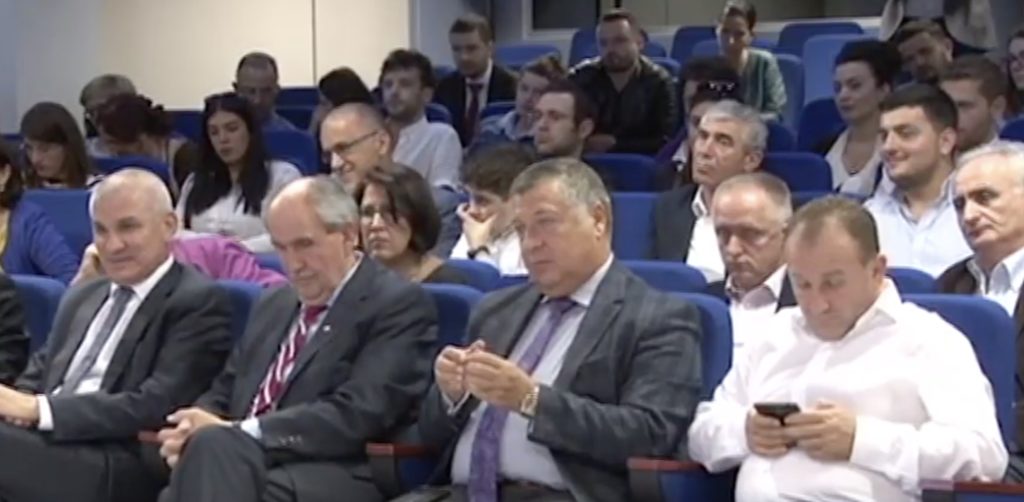
During her speech at the “Media Meets Literacy” conference in Sarajevo, Bosnia, Director Bennett said in October 2017:
VOA PUBLIC RELATIONS
October 04, 2017
We are doubling down on traditional journalistic values, on fairness, on facts because we believe that in the end people recognize the truth.The truth is the best propaganda and lies are the worst. To be persuasive, we must be believable. To be believable, we must be credible. To be credible, we must be truthful and it’s as simple as that. READ MORE
The irony of this statement is that during Amanda Bennett’s watch at the Voice of America, quite a few VOA journalists have posted on social media highly partisan comments showing extreme bias toward certain American politicians and their American supporters whom they personally intensely dislike. Partisan bias has been rampant at the Voice of America, especially since the 2016 election campaign during which Amanda Bennett was already in charge of VOA. In a few instances, some VOA managers and staffers have posted photos of themselves with American politicians, including candidates running for political offices or potential candidates in future elections.
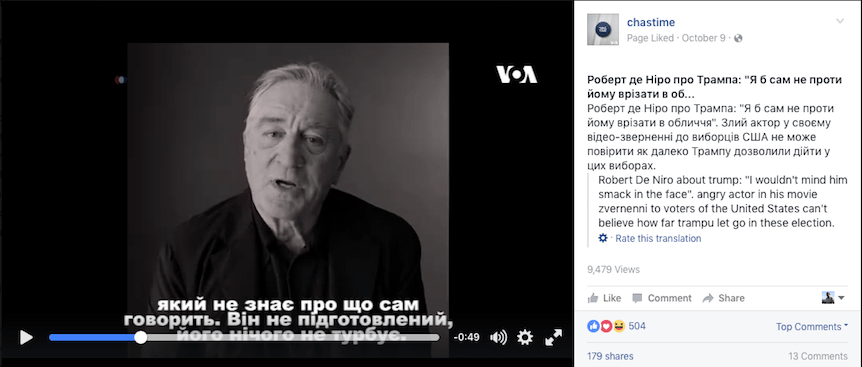
Starting in 2016, when Amanda Bennett became VOA director, some VOA journalists have published on official VOA websites and social media pages, as well as on their personal social media pages, one-sided, partisan attacks on U.S. political figures, mostly Donald Trump, but in at least two cases, also attacks on Senator Bernie Sanders and his supporters.
Some of the VOA journalists in the foreign language services who have engaged in such behavior have a certain following not only abroad but also within the various ethnic communities in the United States where their VOA reporting and social media activities can have an impact on U.S. elections. They can also have an impact on outcomes of foreign elections. It is therefore critical that the VOA director and VOA journalists avoid any appearances of conflict of interest in their U.S. taxpayer-funded, U.S. government-overseen journalistic work. They need to be especially cautious when they meet U.S. and foreign politicians in social or official settings. It would probably be better if such ceremonial meetings were held by top-officials of VOA’s parent federal agency, the U.S. Agency for Global Media (USAGM), assuming that these meetings are somehow necessary, rather than by the VOA director or VOA reporters and managers. Regardless, highly-publicized meetings with foreign politicians by VOA director and other agency officials send a bad message to VOA journalists. Seeing their leaders being chummy with foreign dignitaries may encourage some to be chummy themselves.
The management of the Voice of America and the U.S. Agency for Global Media of course swears up and down that this has never happened and will never happen. But those who have spent years working as rank and file journalists for the Voice of America, as well as for other media outlets, know very well that this is not how things work in the real world.
During World War II and for a few years after the war, some pro-Soviet VOA journalists spread Russian propaganda and encouraged establishment of Stalin-friendly socialist governments in Europe. A few of these VOA journalists later worked for communist regimes as anti-U.S. propagandists. The World War II VOA chief news writer and editor, Howard Fast, received the 1953 Stalin Peace Prize and was a member of the Communist Party and its journalist after the war. The anniversary of his death in 2003 is on March 13. The Voice of America management has never acknowledged his existence. These former VOA journalists accepted employment or benefits from foreign countries. After World war II, a few of them joined thousands of local, pro-regime journalists who praised communist rule and Soviet-style socialism and communism.
The VOA management still does not want this history of VOA’s journalistic failures to be remembered or to admit that it can happen again. However, on October 4, 2018, the Voice of America VOA English News website had a story,”VOA Fires or Proposes Removal of 15 Hausa Service Members Over ‘Improper Payments’.” The bribes were allegedly received while these journalists were still working for the Voice of America.
VOA NEWS
VOA Fires or Proposes Removal of 15 Hausa Service Members Over ‘Improper Payments’
By VOA News, David Jones, Dan Joseph | October 04, 2018 12:00 PM
Amanda Bennett, director of the federally funded news organization, notified VOA staff of the move in an agency-wide email. “It is therefore with a very heavy heart that I must tell you that we have terminated or (in accordance with all applicable Federal laws and regulations) proposed to terminate 15 members of the Hausa Service,” she wrote.
Bennett said the action was taken after simultaneous investigations by VOA staff and the Office of the Inspector General into “allegations of improper conduct by members of the service, which involved accepting improper payments from an official in the coverage area.” READ MORE
What is remarkable about this VOA report is how short it is on critical details, such as where exactly the incident happened, under what circumstances, and what Nigerian politician was alleged to have been involved. VOA and USAGM managers insist that U.S. taxpayers should pay for VOA media outreach to various countries because they lack free media. Well, Nigerian media reporting on the scandal was far more detailed and showed that the bribery happened while a Nigerian government delegation was visiting the Voice of America headquarters in Washington. The local Nigerian reporting was not perfect, but it was far better than what VOA English News wrote about the incident. This was not about one or two rogue journalists but 15 Voice of America broadcasters. VOA has never had a similar scandal that came to light before.
DAILY TRUST
By Nuruddeen M. Abdallah (Abuja) & Habibu Umar Aminu (Katsina) | Published Date Oct 13, 2018 23:54 PM
When the delegation of Katsina State Governor Aminu Masari sauntered into the Hausa section of the Voice of America (VOA) in Washington DC on January 9, 2018, none of the over 15 staff he met had a premonition that the governor’s visit was pregnant with so much trouble that may lead to their unceremonious sack. The interview was conducted and the governor’s entourage was taken round the expansive office of the America’s foreign broadcasting agency.
As the governor entered his car, one of the Katsina State senior officials on the entourage handed down “a brown envelope” containing $5000 to one of the VOA staff that walked them their car. Governor Masari’s spokesperson Mr Abdu Labaran, however, denied that his principal had given any money to the VOA staff during the visit. READ MORE
Since the Hausa Service bribery incident in 2018, the Voice of America Hausa Service has a new management, but it appears that VOA director Amanda Bennett and her deputy Sandy Sugawara have not yet established clear rules on how they themselves and VOA journalists should behave around foreign and U.S. politicians.
What is extraordinary is that only two years ago or so since the Hausa Service bribery incident in 2018, Voice of America senior and mid-level managers allow themselves to be feted by foreign politicians. “Chalk this up as yet another in a long line of embarrassments for VOA and USAGM,” one former senior VOA reporter and service chief told USAGM Watch.


